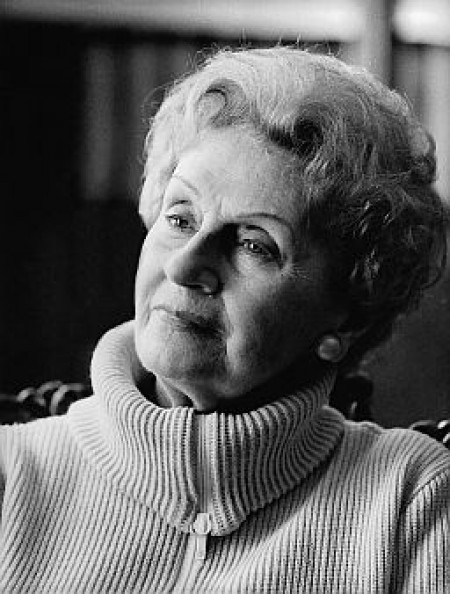
3 March 1908, Budapest – 19 October 1997, Budapest
Júlia Orosz studied with Mrs Vilmos Maleczky at the Music Academy between 1923 and 1928. She had her Opera House debut in 1930 as Blonde. During her career spanning four decades she sang about eighty roles; she was at home in every style of musical literature and in almost every type of role. She had one of the greatest operatic careers from the moment when Radnai engaged her. Her voice lost hardly any of its quality over the decades, and she sang everything from soubrette roles to Verdi and Puccini heroines. The Opera audience heard just as wonderful lyric performances from her (Antonia, Liu, Margaret, Lauretta, Butterfly) as dramatic ones (Desdemona, Elsa, Tosca, Nedda, Lisa in The Queen of Spades) and soubrette roles (Blonde, Ford Annushka, Zerlina, Adel). She was equally familiar with Mozart's style (Susanne, Elvira) and Puccini's world (Liu, Mimi).
The Opera director, Radnai, handed her every new role with the remark: "your next year's contract depends on this!" Every evening he sat on the stage manager's desk and next day awaited her with score in hand, explaining where she made a mistake, or what improvements could be made. It was in this spirit that Júlia Orosz developed her ars poetica, one that served her throughout life: "The art of being a singer means just one thing for me: to serve devotedly the composer."
She became more and more familiar with Mozart from the thirties onwards. By that time the Opera House had a suitable team for performing Mozart: Júlia Orosz carried on the Anna Medek – Margit Nagy line in the lyric-dramatic Mozart heroine roles. After Sergio Failoni's Mozart revivals, András Tóth's endeavour to reprise the works represented a new epoch for them in Budapest. Nádasdy first directed Don Giovanni, in which Júlia Orosz was an unusually energetic, dynamic Donna Elvira. Following the performances conducted by Ferencsik, Júlia Orosz sang the role also under Klemperer's baton.
At the beginning of the thirties Failoni's musical ideas reshaped the Opera House's policies regarding artists and direction. In the "Italian period" Failoni revived a whole series of works from the so-called play-opera genre, having weighed up the possibilities and having come to the conclusion that the only possible way forward for the Hungarian opera was to strengthen the ensemble spirit. In 1931, in a brilliantly conducted Don Pasquale revival, besides the excellent Palló-Komáromy-Halász trio, Júlia Orosz and Sándor Svéd also appeared in the younger casting, and their beautiful singing enchanted the audience. (Even so, the work did not stay as part of the repertoire at that time, despite the fact that the experienced and severe critic, Sándor Jemnitz, predicted a long run for the production.)
Failoni turned Respighi's eclectic music, La Fiamma, into brilliant dramatic music in the 1937 premier, which had serious cultural policy significance. In this work the splendour of the Opera House team in the thirties shone, with the appearance of Rózsi Walter, Mária Budanovits, János Halmos, Imre Palló and Júlia Orosz.
Besides cultivating the Mozart and Wagner repertoire, Klemperer also took some side trips. He recreated The Tales of Hoffmann, in the old production, but bringing it musically closer to the original. Antonia was sung by Júlia Orosz. She also sang the title role in Traviata when it was revived by Klemperer.
As a result of the particular programme policy of the fifties, in 1952 the Opera – after lengthy studies, including trips to Poland – put on Halka, the national-romantic opera of the Polish Moniuszko, with the greatest stars, among them Júla Orosz. However, despite the very high standard of the production, it failed to achieve the audience success needed to keep it on the repertoire.
In the course of the Erkel revivals of the following years, Júlia Orosz "shared" the role of Mária Gara with Mária Gyurkovics in Hunyadi László.
Her brilliant career was rewarded with several prizes, among them the Kossuth Prize, the title, Outstanding Artist, and permanent membership of the Opera House.
A.T.


